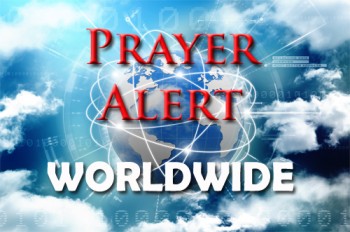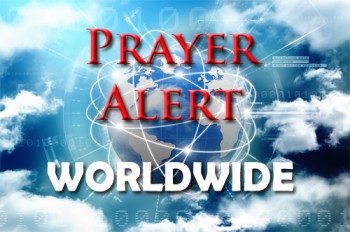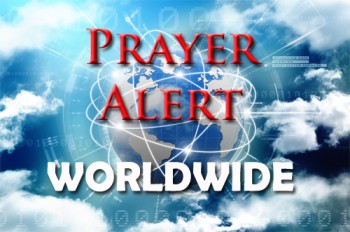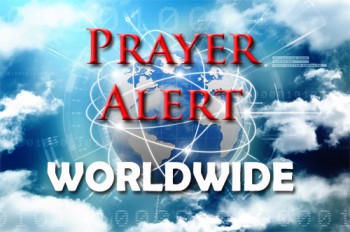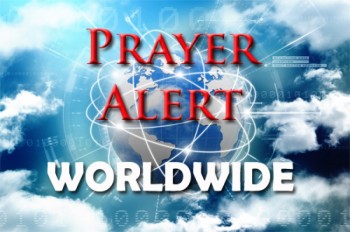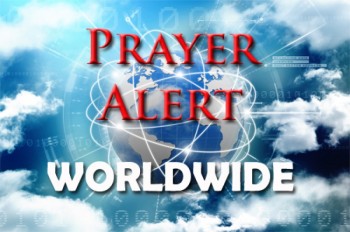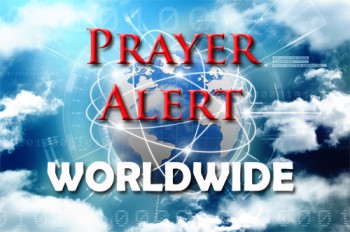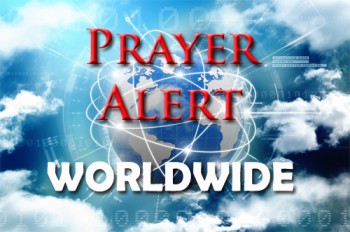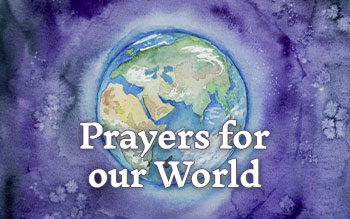Displaying items by tag: Asia
Syria: car bombing, stoning, rape and torture
In July at least eight people were injured outside a church by an IS car bomb, in an area held by the Kurdish YPG militia. On the same day in Afrin, on the border with Turkey, a bomb killed eleven civilians, including children, and injured others, some seriously. Homes were damaged in the explosion and subsequent fire. A few days earlier a retired Christian school teacher went missing from her home in a mainly-Christian village near Idlib. The next day her body was found nearby: she had been raped repeatedly, tortured, and stoned to death by Islamist militants linked to an rebel group in the area. Forensic investigation found that the barbaric ordeal had lasted for around nine hours before she finally died.
Hong Kong: one country two systems?
Please pray for resolution between Hong Kong's pro-democracy people and China’s government. After police firing as many rounds of tear gas in one day as during the entire months of June and July, a general strike, and days of disruptions at Hong Kong Airport, protesters are now being called terrorists and China’s ambassador to the UK has warned that troops will intervene to restore order if necessary. Videos show a massive number of Chinese military vehicles gathering along the border. Hong Kong has its own legal system, borders, and rights including freedom of assembly and free speech, which are all meant to be protected. But things are changing. Rights groups accuse China of meddling in Hong Kong with legal rulings that disqualify pro-democracy legislators; also, five Hong Kong booksellers and a tycoon disappeared, all eventually re-emerging in custody in China. Artists and writers are under increased pressure to self-censor.
Afghanistan: radical Islamists recruit at universities
Since IS was driven out of Iraq and Syria, it appears to have its sights set on Afghanistan. While the Afghan government is engaged in peace talks with the hard-line Taliban movement, radical Islamist groups are spreading their ideology at universities. Basira Akhtar, a 22-year-old student, was beaten up twice earlier this year, at her university in Kabul, when her headscarf slipped from her head. In both cases she was accused of promoting Christianity. An Open Doors analyst says, ‘The core of IS militants in Afghanistan consists of many disgruntled Taliban splinter groups and, reportedly, some returning fighters from Syria. They will try to attack in Afghanistan, just like the Indonesian couple who bombed a cathedral in the Philippines in January. For Christians, this basically means that they need to continue to keep their faith hidden as much as possible.’
Kazakhstan: officials harass churches
Officials are harassing founders of religious communities, possibly trying to block applications to exist. In May police began harassing Oskemen's New Life Protestant Church as it sought re-registration after changing its name. Officers visited parishioners late at night, threatening one woman in her late 70s. People who give their names as founders of religious organisations applying for legal status continue to face harassment and intrusive questioning. Against international law, Kazakhstan bans all exercise of freedom of religion and belief without state permission. The UN Human Rights Committee states, ‘No one can be compelled to reveal his thoughts or adherence to a religion or belief.’ A church member said, ‘At present the founders do not think that their rights are being protected by the law or its representatives. We are being subjected to pressure, which cannot help but arouse concern about the right to freedom of conscience in Kazakhstan.’
China: World’s first human-monkey hybrid
A human-monkey hybrid was created in a Chinese laboratory by injecting human stem cells capable of creating any type of tissue into a monkey embryo. The experiment was stopped before the embryo was born. The scientists were Spanish but held the trial in China to evade a ban on such procedures in Spain. They said a human-monkey hybrid could have been born. The embryo was genetically modified to deactivate genes that control organ growth. Ethical concerns were raised over stem cells migrating to the brain. The scientists said mechanisms were in place for cells to self-destruct if that happened. Thomas Aquinas said that if when doing something morally good there is an unintended side-effect that’s OK as long as the side-effect was not the objective. We can pray for all countries to forbid crossing the physical and spiritual laws separating one species from another. What would happen to the hybrid’s soul, conscience, spirit?
India: Unrest
Jammu and Kashmir (JK) is in militarised Kashmir, an Indian region dividing India and Pakistan. On 5 August Indian authorities revoked JK’s special status that had allowed them to make their own laws, and anticipating resistance they imposed an unprecedented clampdown - shutting down the internet, media and mobile phones, barring movement and jailing Kashmiri leaders. They argued that JK’s ‘special status’ hindered integration by their Muslim majority population with the rest of Hindu India. The disputed region has had two wars fought over it by India, Pakistan and China. Narendra Modi reached out to people of JK, in the five languages spoken there, trying to instil peace on the troubled streets of a new Kashmir; which has been stripped of its constitution, flag, and hereditary rights. A historical powder keg has been ignited. The US asked Pakistan to refrain from ‘retaliatory aggression’ as airspace corridors were closed and bilateral trade suspended. China’s foreign ministry voiced ‘serious concern’ over India’s contentious move over an area claimed by both countries. See
Afghan Christians share Christ
Voice of the Martyrs recently reported, ‘Afghan believers are boldly sharing the gospel in their country like never before in its history. In a nation that is 99 percent Muslim, the risks of such ministry are incredible. But many of these courageous followers of Christ have decided their countrymen must hear that God loves them, that Jesus Christ has paid for their sins, and that there is a guaranteed future for them with God through Jesus. Their witness is producing fruit: today there are Christians throughout the country of Afghanistan. Over the years, Afghan believers have often hidden their faith, but there are men and women willing to share the gospel courageously throughout Afghanistan and other Asian nations where Christians are persecuted for their faith.’
UN condemns 'international indifference' to Syria
The UN human rights chief Michelle Bachelet says that those responsible for airstrikes targeting Syrian civilians could be charged with war crimes, calling it ‘a failure of leadership by the world's most powerful nations’. Since late April 400,000 have been displaced and over 730 civilians killed by Syrian and Russian attacks on militant-held Idlib where three million still live. The airstrikes on schools, hospitals, markets and bakeries killed over 103 civilians in just ten days, including 26 schoolchildren killed in their classroom seats. Ms Bachelet added, ‘These are civilian objects, and it seems highly unlikely, given the persistent pattern of such attacks, that they are all being hit by accident. There is an international indifference to the rising civilian death toll caused by a succession of airstrikes.` Both the Syrians and Russians deny targeting civilians or civilian infrastructure.
Hong Kong: protests now violent and ‘illegal’
Demonstrators' demands have included the withdrawal of an extradition bill; demanding an inquiry into police brutality; removing the ‘riot’ label from peaceful protests; the release of arrested demonstrators; and universal suffrage. Their marches on 27 July were called ‘illegal’ by Chinese authorities after the previous week’s infiltration by Triad (mafia) agitators. Protesters complained that the police stood back and allowed mafia-initiated violence. The next day they marched again, and the violence hit a new level of pain and injury. Hong Kong’s protests have lasted eight weeks and are spreading into more remote communities. Protests are becoming more violent - setting fire to carts and throwing dangerous projectiles met by enormous plumes of teargas. Parents and children washed their eyes out in the teargas fog. On 30 July hundreds of protesters blocked access to commuter trains, causing widespread disruption during the rush hour. Pray for the international community to take action.
Hong Kong Police Fire Tear Gas After Protesters Defy Ban
HONG KONG (AP) — Police in Hong Kong fired tear gas Saturday at protesters who defied authorities’ warnings not to march in a neighborhood where six days earlier a mob apparently targeting demonstrators brutally attacked people in a train station.
Protesters wearing black streamed through Yuen Long, even though police refused to grant permission for the march, citing risks of confrontations between demonstrators and local residents.
For the protesters, it was a show of defiance against the white-clad assailants who beat dozens of people last Sunday night, including some demonstrators heading home after the latest mass protest in the summer-long pro-democracy movement. Police said some of the attackers at the train station were connected to triad gangs and others were villagers who live in the area.
The streets of Yuen Long became a sea of umbrellas as the march began Saturday afternoon. A symbol going back to the Occupy Central protests that shook Hong Kong in 2014, umbrellas have become tools to help protesters conceal their identities from police cameras as well as shields against tear gas and pepper spray. Some also wore masks to obscure their faces.
“Hong Kong police know the law and break the law,” protesters chanted as they made their way through the streets.
Less than three hours after the start of the march, police fired tear gas to try to disperse crowds that had ignored authorities’ appeals to leave the area. Police said in a statement that they were clearing out the protesters, who were “holding iron poles, self-made shields and even removing fences from roads.”
Some protesters also endangered police officers’ lives by surrounding and vandalizing an occupied police vehicle, the statement added.
As the demonstration rolled into the evening, officers in riot gear faced off with protesters using wooden sheets as shields. Live footage from broadcaster RTHK showed protesters on one street forcing back riot police by throwing umbrellas and waving rods at them. On another street, officers repeatedly raised warnings and fired tear gas at masked demonstrators who were standing their ground.
Hong Kong’s public transit network had announced that its trains would not be making their usual stops in Yuen Long on Saturday, but protesters later reported being able to disembark at stations in the neighborhood. Several area businesses and public facilities were closed in anticipation of the march. Service at a nursing center was temporarily suspended, and sports venues shut down early.
A few hours before the march started, a man was arrested in Yuen Long for injuring someone with a knife, police said.
Massive demonstrations began in Hong Kong early last month against an extradition bill that would have allowed suspects to face trial in mainland China, where critics say their rights would be compromised. The bill was eventually suspended, but protesters’ demands have grown to include direct elections, the dissolution of the current legislature and an investigation into alleged police brutality in the Chinese territory.
A former British colony, Hong Kong was returned to China in 1997 under the framework of “one country, two systems.” The arrangement promises the city certain democratic freedoms that are not afforded mainland citizens, but some residents say these liberties have been steadily eroded in recent years after the arrests of booksellers and democracy activists.
A distrust of China’s Communist Party-led central government in Beijing has undergirded the protests this summer. After last Sunday’s march, a group of protesters vandalized Hong Kong’s Liaison Office, which represents the mainland government. They spray-painted the building’s surveillance cameras and threw eggs and black ink at the Chinese national emblem, an act that Beijing has vehemently condemned.
In response to the police’s objection to Saturday’s march in Yuen Long, protesters have cheekily labeled the procession a “shopping trip,” as well as a memorial service for former Chinese Premier Li Peng, who died on Monday. Li was a hard-liner best known for announcing martial law during the 1989 Tiananmen Square protests that ended in bloodshed.
Some Yuen Long residents participated in the march, while others stood outside with signs warning protesters not to enter. For their part, demonstrators pasted calls for democracy on sticky notes around the area.
“After the violence (last Sunday), as a resident of Yuen Long, I think I have the responsibility to come out,” said a 24-year-old man surnamed Man. “After all these protests in past months, the government still hasn’t responded to us.”
With reporting by Associated Press
This article that shares some of the voices of the youth in HK.
As you pray, you may listen to the hearts of those protesting/fighting.
(1.) afraid of post-2048 one country one system HK (with restrictions on personal freedoms and justice)
(2.) no hope for a house / home of their own.
Matthew (from Hong Kong)
Pray: For the democratic rights of the people of Hong Kong to be preserved and respected.
Pray: For a de-escalation of the situation and that anymarches will be peaceful.
